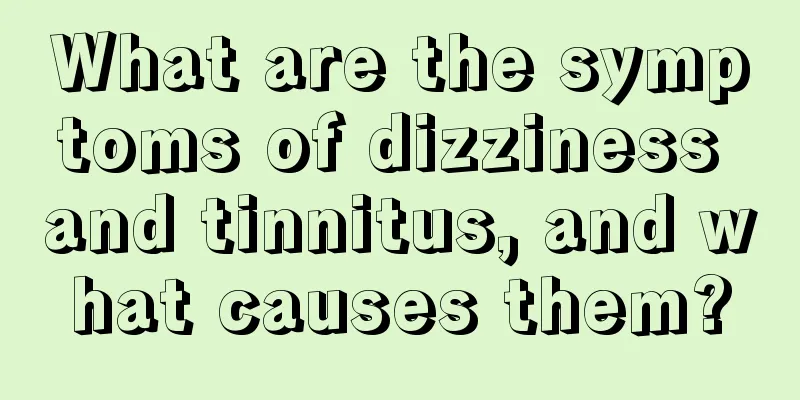What are the symptoms of dizziness and tinnitus, and what causes them?

|
If you experience dizziness and buzzing in your ears, you should pay attention, as these may be signs of physical problems. You can relax and rest for a few days to see if the condition improves. If not, you should go to the hospital for a detailed examination. Causes of dizziness Dizziness is caused by the dilation of blood vessels in the skin, increased blood flow and reduced blood flow to the brain. This phenomenon may be caused by prolonged exposure to the sun, taking a hot bath for too long, or being nervous or angry. In addition to the above reasons, vitamin deficiency, abnormal hormone secretion, menopause or autonomic nervous system disorders are also factors that cause dizziness. There are two main causes of tinnitus: one is caused by ear diseases and the other is caused by systemic diseases. 1. Otogenic tinnitus: ⑴ Lesions of the sound-transmitting part (external ear and middle ear): cerumen embolism in the external auditory canal, external auditory canal eczema, myringitis, otitis media, and Eustachian tube dysfunction. The tinnitus caused by this type of disease is generally not serious and will disappear after the cause is eliminated. ⑵ Lesions of the sensory part (inner ear): Meniere's disease, noise-induced hearing loss, ototoxic food poisoning, sudden deafness, etc. The tinnitus caused by this type of disease is more serious. ⑶ Retrocochlear lesions (acoustic nerve): Hunter syndrome, acoustic neuritis, acoustic neuropathy, acoustic neuroma. ⑷ Lesions of the auditory center (the auditory conduction pathway from the cochlear nerve nucleus to the auditory cortex of the brain): efferent nerve dysfunction, cerebral hemorrhage, dorsolateral medulla syndrome, etc. The tinnitus caused by this type of lesion is very stubborn. 2. Tinnitus caused by systemic diseases: ⑴ Cardiovascular and cerebrovascular diseases: hypertension, hypotension, anemia, coronary heart disease, arteriosclerosis, cerebral thrombosis, hemangioma, arteriovenous aneurysm. This type of disease often causes pulsating tinnitus that is consistent with the pulse. ⑵ Cervical spondylosis: cervical vertebrae A are compressed by bone hyperplasia or herniated disc. ⑶ Brain trauma or nervous system disease: head trauma, concussion, encephalitis, meningitis. This type of disease often causes tinnitus and sensorineural hearing loss with high-frequency hearing loss. |
<<: What causes tinnitus, dizziness and nausea? What diseases can cause it?
>>: How are birthmarks formed and what are the aspects
Recommend
Folk remedies for the treatment of esophageal cancer
In China, esophageal cancer has always been treat...
Why is it easy to grow fat on the waist
A woman's abdomen is an area where fat easily...
Can sulfur soap be used to wash your face?
Sulfur soap is a common medicated soap. As the na...
The side effects of lotus seeds, and the taboos of use should be known
Lotus seeds taste slightly bitter and can clear a...
What should elderly people do if they unfortunately suffer from lymphoma
What should elderly people do if they unfortunate...
How much does it cost to diagnose small cell lung cancer
How much does it cost to diagnose small cell lung...
Inhibit melanin formation, scientific sun protection is essential
If female friends want to inhibit the formation o...
Can I eat brown sugar eggs during menstruation?
When women are menstruating, their physical condi...
The difference between a beaker and a thermos cup
Both the stewing cup and the thermos cup are comm...
Which one is stronger, acetic acid or carbonic acid
Acetic acid and carbonic acid are both relatively...
Transparent blisters grow on the inner wall of the mouth
Transparent blisters on the inner wall of the mou...
What is the purpose of wearing pig bones
Many people may not understand the use of wearing...
Detailed explanation of how to increase running speed
Some students need to prepare for school sports e...
Three effective traditional Chinese medicine prescriptions for treating lung cancer
Treatments for lung cancer vary. Those with sever...
What are the symptoms of liver cancer? To prevent liver cancer, do not eat four things
The most typical symptom of liver cancer is feeli...









